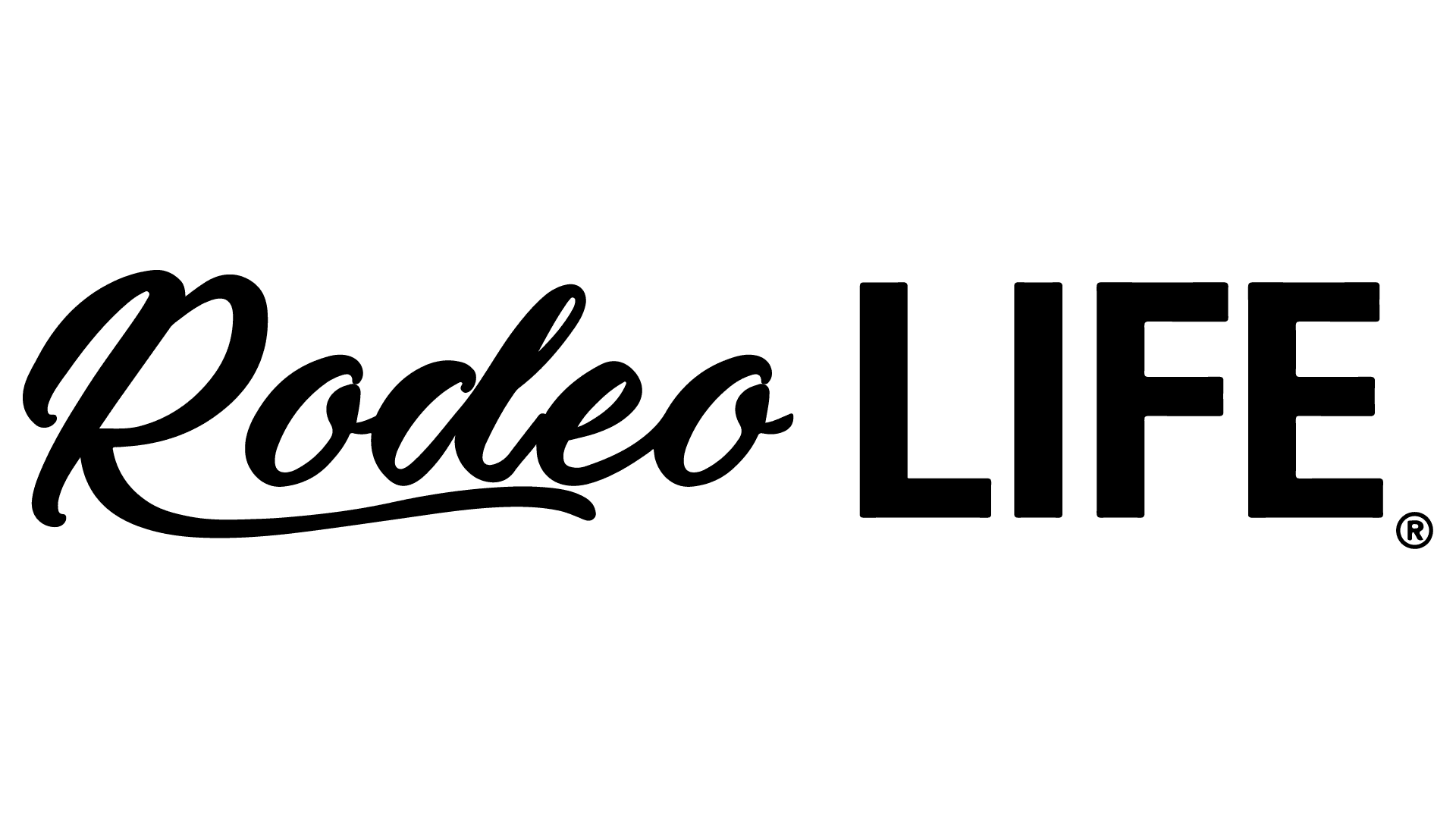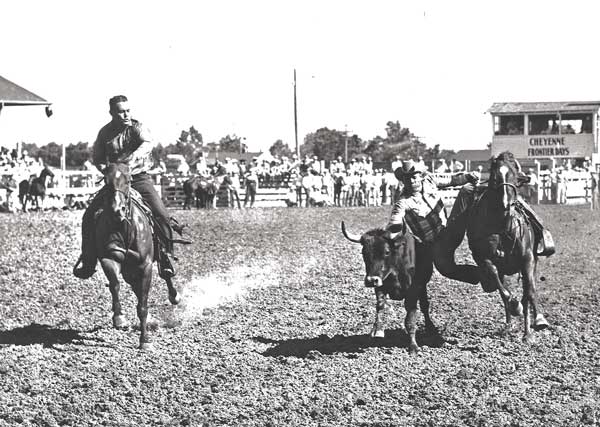story by Judy Goodspeed
“Going down a cotton row with a hoe or pulling a sack gave me the desire to do better. My dad was disabled from a stroke, but back then there was no such thing as a monthly check. The only solution was all ten of us kids worked, and worked hard, but none as hard as our mother. She worked in the field, managed a large garden, canned, cooked, washed by hand, patched our clothes, and kept a clean house. Even though our clothes were patched they were clean and she would always say, ‘Now you kids act as good as you look.’
“My parents Robert (Bob) Hatcher and Flora Tuel Hatcher were both sixteen when they married in 1920. They began married life on an eighty-acre farm sharecropping for Dad’s father. I was born in 1934, the seventh child at that time, three more came later.
“There wasn’t much time for anything but work, but occasionally when we’d get a break we would ride the workhorses.” Phil loved horses and desperately wanted a saddle horse.
“One of our neighbors had horses and did a little trading. I was about fifteen when I ambled over to his place to see what he had. I only had twenty-five dollars in my pocket but was willing to part with it for a horse. He had a three-year-old sorrel gelding he wanted sixty-five dollars for. We worked out a deal and I paid twenty-five down and pulled enough cotton to pay the rest. That little sorrel made a mighty fine horse.”
The little town of Randlett, Oklahoma had a roping arena and Phil became a frequent visitor. He tried his hand at bronc riding and didn’t do very well, tried bull riding and held on for eight seconds.
“I rode the bull but only because he just ran down the arena. Me and one other boy were the only qualifiers so I won second. I decided right then that I didn’t want to ride any more bulls.”
In 1951 Phil and one of his older brothers joined the wheat harvest. They had worked through Oklahoma and made it into Kansas when it came a big rain. It would be days before the ground dried out enough to get back in the fields.
“Our boss asked if we’d like to go to Cheyenne to the rodeo. That was a turning point in my life. I wanted to be in the arena and made up my mind to become a cowboy.”
Phil began to try bull dogging along with calf roping. He really preferred bull dogging and sought out guys who knew something about the event. He was still working at every job he could find which was mainly farming. His dad had died and his mother and three youngest siblings were living in a house a friend had loaned them. Phil helped her as much as he could.
It was about this time that he began dating Norma Bruce. Norma was also from Randlett and they had attended school together, but really didn’t know each other very well. Phil had dropped out of school after the first couple of weeks in the ninth grade. Norma was in the tenth grade when she dropped out of school. They were married in 1954. Phil bought a travel trailer and they started going down the rodeo trail. Years later after they were in one place long enough they returned to school and got their GED.
“I was still farming but making a few rodeos. Problem was I was riding a green horse, but he wasn’t any more green than me. Finally, Aubrey Rankin started schooling me and that helped a bunch. Aubrey bought a good doggin’ horse from Fuzzy Garner. I rode him some but still wasn’t doing much good. It was hard making a living and having money for entry fees. By this time I had taken the plunge and gotten my RCA card.”
Buster Morgan approached Phil and asked him to ride in a quadrille he had organized for the Woodward Rodeo. Phil told him the only way he’d go to Woodward was if he could enter the bull dogging and he didn’t have money for the entry fee. Buster entered him and suggested that Phil ask Lynn Beutler for a job with his rodeo company. Phil was hired to work on the feed crew making ten dollars a day. It wasn’t long before he was also making five dollars a day on the stripping crew. That job involved removing riggin’ from broncs. Then he started grooming the saddle horses and made five more dollars a day.
“This was the perfect place for me. I loved the work, could park my trailer on the rodeo grounds and be close to Norma. The only problem was the three-week layover between Tucson, Arizona Rodeo and the Phoenix, Arizona Rodeo. We moved to Burkburnett, Texas and I farmed for three weeks. Norma was pregnant so I decided to stay close to home until the baby was born.”
After Wayne arrived Phil and Norma hit the rodeo trail again. Phil still worked for Beutler Brothers, but had moved up to supervisor over the feeding crew. Slim Whaley was another cowboy who worked for Beutler Brothers. One of his duties was to buy the saddle horses used in the show and work as a pickup man during the bareback and saddle bronc events. A pickup man also works the bull riding. His job primarily is to get bulls out of the arena as quickly as possible. There is always a chance for something to go wrong so a good horse is essential. Phil was honored when Lynn Beutler asked him if he would fill in for Slim while he recovered from an injury.
“One thing that helped me decide to take the job was I knew Slim had good, dependable horses. The biggest danger for a pickup man was having to rope a mean bull and drag him out of the arena. For a short time, if the gate man isn’t quick enough, you are in a tight place with a big mad animal.”
Everything was going well for Phil and Norma. He was winning or placing in most of the rodeos he entered, mostly in the steer wrestling but often in the calf roping also. He and Norma decided they would like to buy a place and maybe run some cattle, so they started putting money aside when they could.
“We had saved a thousand dollars when I found a horse that I thought I had to have. Without telling Norma I paid six hundred dollars for the horse. Needless to say she was not happy. I think at that time in my life if I’d had to choose between rodeo and my family I’d have picked rodeo. Fortunately, I didn’t have to do that.”
In 1961, Wayne started to school in Burkburnett, Texas. Phil moved the travel trailer to a friend’s yard and that’s where Norma and Wayne lived until summer. Once school was out the family hit the road together.
Phil qualified for the National Finals in 1962. He was winning and doing well so he decided to quit working for Beutler Brothers and rodeo full time. He was broke by the end of the year, so he went back to Lynn and asked for his job back. Lynn made an exception in Phil’s case because he didn’t usually hire back workers who quit, but he hired Phil.
“Lynn saved my bacon.”
Harry Vold approached Phil and asked him to work for him. Phil explained that he would work for him when he wasn’t working rodeos for Lynn if it was okay with Lynn.
“I needed as much work as possible and I really liked Harry. I stayed busy making twenty-three or more rodeos a year. To this day I think of Harry Vold as Mr. Rodeo. He started at the bottom and worked his way up and is a super nice guy.”
Norma and Phil finally started looking for a place to buy. While visiting Jim and Deloris Smith they found forty acres near Okemah, Oklahoma. We looked the place over and decided that it would serve our purpose. So Phil borrowed five thousand dollars and bought a house and forty acres.
“Being in debt bothered me, but the old man I bought the place from tried to reassure me. ‘He said you’re young and healthy. You’ll have that note paid off in no time.’”
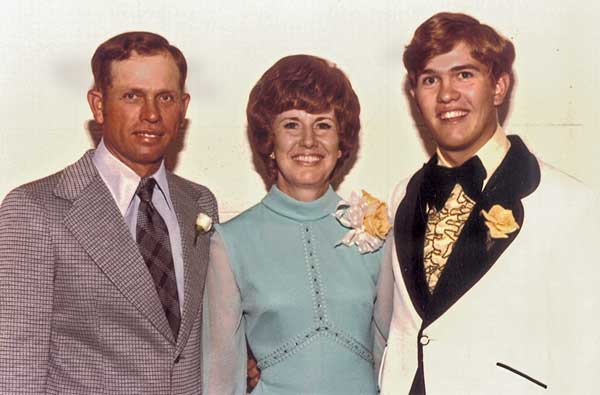
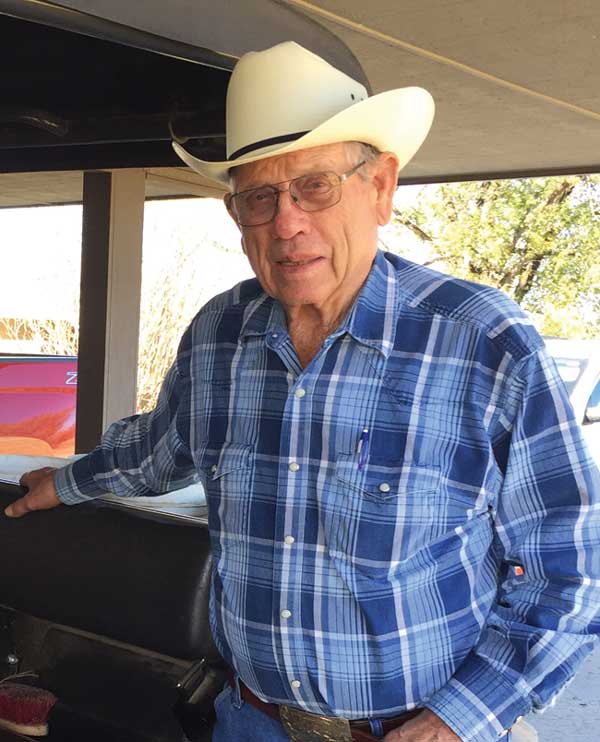
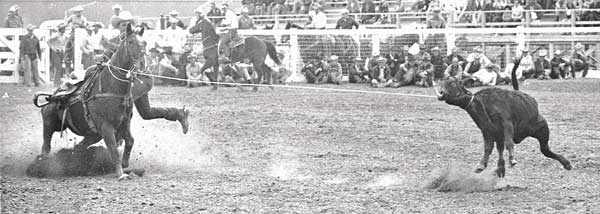
Phil got Norma and Wayne settled and headed to Tucson. After the rodeo, he returned home to wait the three weeks until Phoenix. He loaded up his horse, hooked up his travel trailer and got about to Chandler, Oklahoma when an eighteen-wheeler pulled out in front of him. Phil couldn’t avoid hitting him. His pickup was totaled, his horse killed, and the travel trailer destroyed. Now, he was really in debt, but he picked up and went on.
As it turned out he won the bull dogging at Guymon, Oklahoma, the all around at El Paso, Texas and split the average at Denver with Bill Linderman.
“Now that was one of the highlights of my rodeo life. Bill was my idol and one of the nicest guys I knew. I went home with enough money to pay off my debt. That’s another thing I loved about rodeo, it afforded an old poor boy the opportunity to get ahead.”
In 1972 at Nampa, Idaho, Phil was running some fresh steers to see if they were going to do for the rodeo. The horse he was using was young but had never offered to buck.
“It was a crazy deal. I started to get down on my steer but changed my mind before sliding out of the saddle. When I collected myself to get back seated I must have hit the horse in the flank with a spur. He had never bucked but that didn’t mean he couldn’t. He started pitching and instead of bailing out I tried to ride him. I wound up with a broken, torn up knee.
“I was an upset man. We had no income and I was going to be laid up for a spell. Just when I thought all was lost Norma announced she was going to work at the Wrangler Blue Bell factory in Okemah. Later she began working in the treasurer’s office at the Okemah County Courthouse. We survived.”
Phil was disabled for sixteen months and the doctor said he would probably never jump another steer. Twenty-three months after his accident he won second at Hinton, Oklahoma. He continued to rodeo but stayed close to home until time for Cheyenne rolled around. He had to go, but this time he flew instead of driving.
“It’s every dogger’s dream to win Cheyenne and I came close in 1974. My last steer dog fell on me and knocked me out of the running.”
In his rodeo career Phil entered won the all around at Colorado Springs twice, the bull doggin’ at Albuquerque, New Mexico, Nampa, Idaho, Little Rock, Arkansas, Kansas City, Kansas, Plainview, Texas and the all around at Weiser, Idaho. He made the National Finals in 1962 in the steer wrestling, worked at the Finals as a pickup man in 66, 68, and 70, and was a timed event judge at the Finals in 73, and 75. He retired from rodeo in 1975.
“With Norma’s help I had bought up some more land and leased some so we were running mama cows and doing okay. Wayne had graduated high school and been accepted at West Point. I did some cattle buying for people, hauled cattle, took care of cattle for area ranchers, shod horses and broke colts. In 1986 I decided to sell my mama cows and buy yearlings, that is still what I’m doing now.”
Wayne didn’t go back to West Point after his first year even though he enjoyed attending there. He decided to marry his long-time sweetheart and attend Oklahoma State University for a degree in Horticulture. He and his wife have three children.
“Norma passed away in 2008. I miss her everyday. She put up with a lot, but we were both raised in good Christian homes so divorce wasn’t even considered. She was a good woman and I give her credit for doing most of Wayne’s raising.
“I didn’t leave as big a footprint as some of my contemporaries, but no one worked any harder or loved rodeo any more than I did. I never turned my stock out even if the weather was awful, or I was out of the money. There was no quit in me.”
